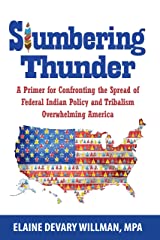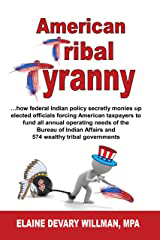
About Going To Pieces . . . the Dismantling of the United States of America: Think “Thelma and Louise” – two women who took an unusual road trip. Only the road trip that is Going To Pieces . . . is about a system taking down this country economically, politically and geographically. The author and a videographer journeyed across 17 Indian reservations from Washington State to New York, capturing over 130 hours of direct testimony on video from farmers, tribal members, teachers, bankers, sheriffs – all manner of folk who live within the historic or actual boundaries of Indian reservations. The stories captured were so stark. The folks speaking had felt unheard for decades. The author promised each of them that their story would be told and offered anonymity to anyone in need. No one wanted anonymity. “Tell the truth; we have to be heard.” While the road trip occurred in the fall of 2004, and the book was written in the spring of 2005, due to serious controversy and risk, the author has just this year assigned an ISBN number to Going to Pieces . . . and made it available to the open market. The original purpose of the journey was to produce an 88-minute documentary, but the people interviewed and the stories told were so many, a documentary fell short. So, the author transcribed the actual words from the 130 hours of video, and re-lived the journey for the reader. The reader is asked to realize that this book only addresses 17 of the 565 federally recognized Indian tribes, and leaves it to the reader to imagine the full impact occurring across rural America, and now through tribal casinos, seeping quickly into urban America. Mainstream media is continuously and substantially funded by tribal casino advertising dollars that the reality of life on Indian reservations is taboo to discuss out loud or on television, in print or on the radio. The end result is “hush-money” to never discuss real life on Indian reservations. Both political parties are equally funded with campaign donations from tribal governments, tribal associations and thousands of lobbyists, to the extent that Congress quickly serves some 565 tribal governments and turns a mournful deaf ear to the hundreds of thousands of their constituents who live on or near Indian reservations but are not tribal members. Do you know . . . that at least 90 major public spaces and natural resources, including Redwood National Monument (CA) and Joshua Tree National Monument (CA), are targeted by the Department of the Interior, the Bureau of Land Management, the Bureau of Reclamation, the National Park Service and U.S. Fish and Wildlife, to be turned over to private tribal governments? The list includes: 41 national refuges; 34 national parks, wildlife refuges and hatcheries; and 15 regional water projects. In each instance, a tribe will take over the management of these public lands. The problem is that what tribes do rarely involves any public process, oversight or transparency. As can be seen in the areas where tribal governments have taken over or been given oversight of public lands, public access is often limited or ended. And the tribes won’t pay for the management of these sites; the taxpayers will. Do you know . . . that one small Montana tribe of 5,130 people had, in 2004, an annual Operational Management Budget of $373 million? This annual budget of a single tribe is larger than the national U.S. Fish and Wildlife’s annual budget for the entire country. Do you know . . . every Indian reservation is co-located within a county or counties and often towns, villages and cities? Their tribal government annual operating budgets exceed the annual operating budget of the counties in which they are located.

Are you a community leader or landowner on an Indian reservation having difficulty finding information on federal Indian policy decisions that affect your county, town or private land? Slumbering Thunder provides informational strength and reference for a basic knowledge of government decisions affecting your life, the lives of struggling tribal families, and the future of your state, and our country. The federal Executive Branch and federal agencies are using 566 tribal governments and Indian reservations in 43 states as launch pads to expand tribal authority over non-tribal citizens. The rapid spread of tribalism is erasing state authority over its natural resources, and protections of property rights and citizens. American taxpayers in metropolitan areas may also be shocked to know the direct impacts upon all Americans, even those living far distant from reservations. This book addresses a bottomless-pit of annual trillions of taxpayer dollars keeping tribal families in apartheid and continual poverty. Slumbering Thunder will give you decision-making tools, model letters, and commentaries about your protections, rights of local governments and states when experiencing federal and tribal government intrusions.

Sail On! Sail On!
Oh Mighty Ship of State!
To the Shores of Need,
Past the Reefs of Greed,
Through the Squalls of Hate . . .
Sail On! Sail On! Sail On!
– Leonard Cohen
From the preface to American Tribal Tyranny: From its original construction and launch following the Revolutionary War, America’s Mighty Ship of State has known almost continuously tumultuous waters, with little hope of a forever safe harbor. I cannot pretend to know the innermost thoughts of Leonard Cohen when he penned the lyrics of Democracy. I don’t know if Cohen was thinking of freedom, socialism, communism or America’s constitution. What I take from his incredible lyrics, however, is the ruthlessly honest description of my beloved America . . . “Cradle of the best and the worst . . . it’s here they have the range and the machinery for change, and it’s here they have the spiritual thirst“.
Toward the end of his song, Cohen says: “I’m sentimental if you know what I mean . . . I love this country but I can’t stand the scene“. My sentiments exactly. I, too, love this country but I can’t stand the scene. So it is time to raise my voice once again and do all that I can to change our country’s “scene”.
There is one other set of Cohen lyrics that in my view perfectly describes the American public perception of of federal Indian policy: “It’s coming from the feel that it ain’t exactly real, or it’s real but it ain’t exactly there.” The greater American public, particularily large populations on both coasts, are fairly oblivious to tribal governments and reservations. Their information is pretty limited to visiting Indian casinos. The irony here is that the hated White Man is the customer base of mega-wealthy tribal casinos, but that issue is for further discussion later in the book.
The overarching message of American Tribal Tyranny is the urgent need to restore our Ship of State, our country to One Nation Under God . . . indivisible by the unconstitutional imposition of 574 tribal governments increasingly spreading a non-republic form of government in the majority of our 50 states. Ending tribalism as a governing system in this country will be a Herculean task across very tumultuous waters, but then so was the removal of slavery from this land, securing women’s right to vote and own property, and other country-shaping paths forward. I invite the reader to put on a life jacket and join me in this journey to bring our Mighty Ship of State back to the navigational tools of the US Constitution and One Nation Under God.
Note: To hear Leonard Cohen’s entire song, Democracy, internet search YouTube Leonard Cohen “Democracy” or click on the link below.